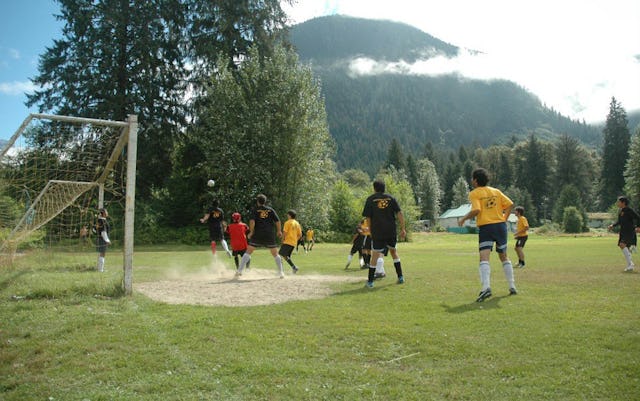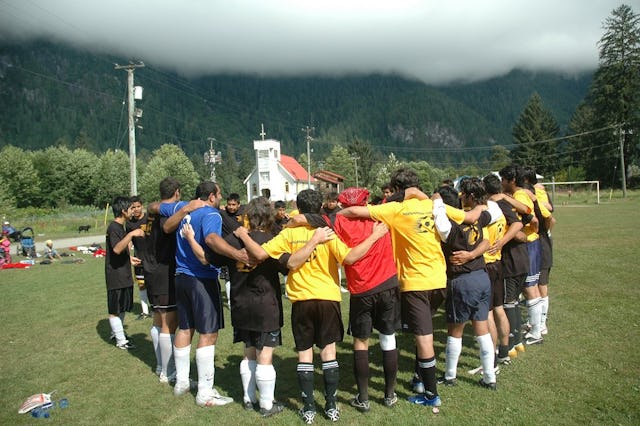First Nations and Baha'i youth bond through soccer
KINGCOME INLET, Canada — It's not often the players on opposite sides of a soccer team huddle together for prayers before a game.
But neither is it common for outsiders to play in a soccer league that is otherwise composed entirely of Native Canadians.
The Twin Arrows soccer team, made up of young Baha'is from the cities of Victoria, Nanaimo, and Vancouver in British Columbia on Canada's West Coast recently wrapped up its fifth season playing in a regional soccer league here, which is otherwise made up entirely of First Nations peoples -- one of the indigenous communities here.
Established in 1958, the league is composed of teams representing various tribal communities in and around Queen Charlotte Strait, on the northern end of Vancouver Island and also on the mainland.
The Baha'is were invited to join the league in 2002 and since then have managed to fit in well into a league that is as much about community fellowship as it is about high-energy soccer.
"The purpose for our participation is really to build bridges between our two communities," said Sebastian Titone, 25, a Baha'i from Nanaimo, who is the team captain and head coach of the Twin Arrows. "In Canada, you generally find the native communities on one side and the white/European communities on the other.
"But as Baha'is, we talk about all of us being one people. So we try to be part of cultural events and to make exchanges of friendship. And soccer is really a big part of First Nations community life, and it is one way to engage in community bridging," said Mr. Titone.
The weekend of 12-13 August 2006 saw the conclusion of a home-and-home series between the Baha'is and the Musgamagw First Nations.
Dubbed the "Musgamagw Cup," this mini-tournament was initiated by the Baha'is to honour the friendships that have developed over the years between the Baha'is and many of the Musgamagw families living in Kingcome Inlet and Gilford Island, which lie opposite Vancouver Island.
Aside from the soccer game, the Baha'is were treated to a feast with the Musgamagw families and then participated in a ceremony in the big house, where they were invited to speak for 20 minutes, a rare privilege for visitors.
The game itself began, as the last few have, with players from both sides huddling together to say prayers. The Baha'is offered a prayer revealed by Baha'u'llah on the theme of healing.
"It was really neat to see the two teams with their arms around each other, circling in the middle of the field to have a moment of prayer before they began," says Evelyn Voyageur, a Musgamagw from Kingcome Inlet.
"We have had [in the past] moments of silence for so-and-so, but this was never done. I think that says a lot about how we feel about the Baha'is being in our community. They've been really well accepted," Ms. Voyageur said.
The relationship between the Baha'is and the First Nations communities precedes the establishment of the soccer team. Baha'is from the Vancouver area had been going up to serve at potlatches of the Namgis First Nations in nearby Alert Bay since the late 1990s.
In 2001, Sonny Voyageur, who is Ms. Voyageur's son and a Baha'i, had the idea of establishing a Baha'i team. The Baha'is were invited to join that year.
"The game of soccer is an institution in many of the native communities," said Mr. Voyageur, noting that during the early years of the last century, soccer was the only way tribes could legally congregate under now-repealed laws that sought to ban traditional ceremonies and activities.
About 15 Baha'is played that first year, including Mr. Titone, who had then recently moved to Canada from his native France.
"Even though we were losing, they were still cheering," said Mr. Titone, speaking of the family and friends who came out to support the Baha'is. "It showed that it's not just about winning, but about being there and being together."
The league was by then already long established, and it was the relationship the Baha'is had with the Musgamagw community that persuaded organizers to extend the invitation. Before and since then, no other non-aboriginal community has been invited.
In April of this year about 80 Musgamagw players, their family members, and their friends came to Maxwell International School, a Baha'i school in Shawnigan Lake for the first game of the season. The visiting team designed special jerseys for the occasion that read "Musgamagw-Baha'i 2006."
The relationship between the two teams reached another milestone this year when Baha'i women got the chance to play in the league. Seven Baha'i women were invited to join ten aboriginal women from Alert Bay and Kingcome Inlet. That team now plays regularly in women's tournaments.
The name of the men's team, Twin Arrows, is a reference to the Bab and Baha'u'llah, the Founders of the Babi and Baha'i religions respectively, who are sometimes referred to as "Twin Manifestations of God." The other teams, though, often just affectionately refer to them as "the Baha'is."
-- Canadian Baha'i News Service

